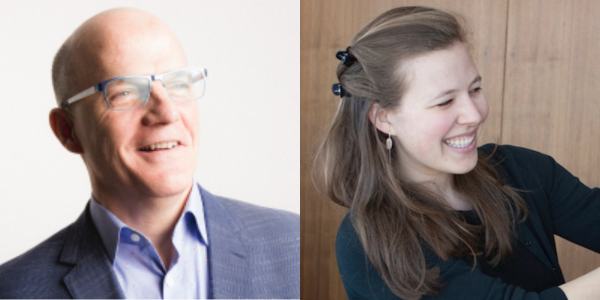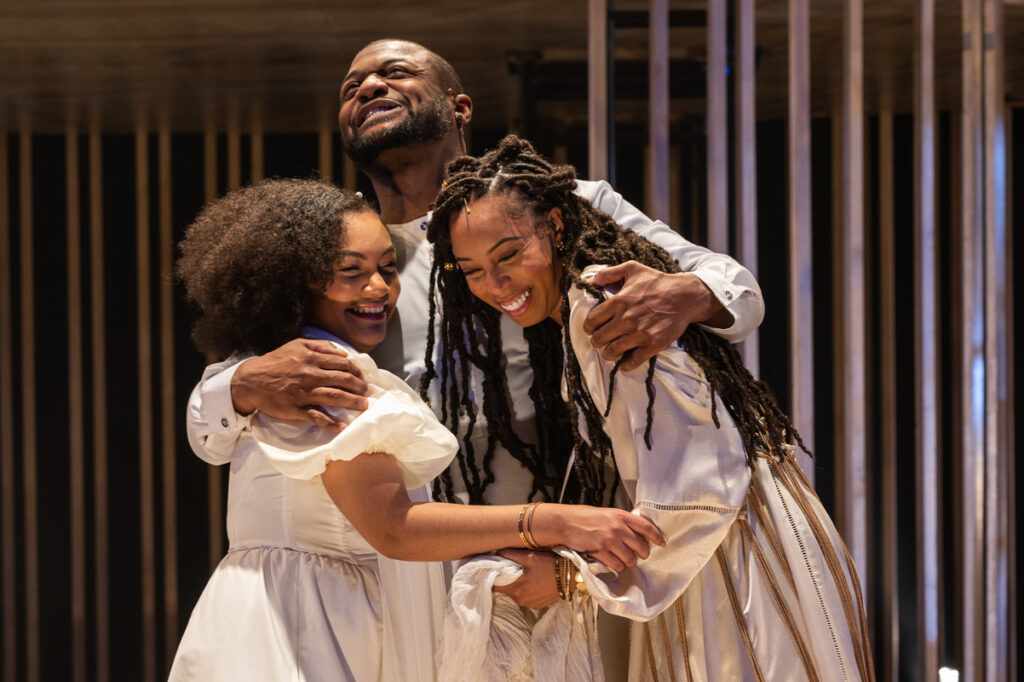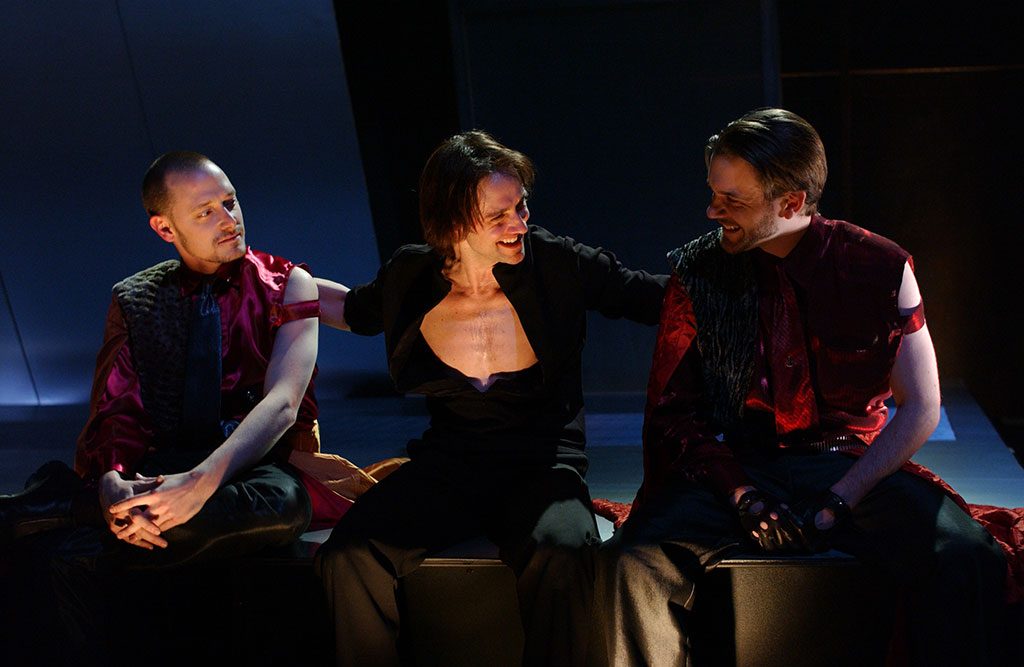In Conversation: Director Charles Newell and Dramaturg Marissa Fenley

Production Dramaturg Marissa Fenley interviewed Director Charles Newell about Rosencrantz and Guildenstern Are Dead, inquiring about legacy, the transformational power of theatre, joy, and the distinct realms of the play. The resulting conversation was equal parts emotional and intellectual, much like Stoppard’s work.
Below is a snapshot of two creatives in conversation, and a meditation on Newell’s thirty-year journey as his tenure as Marilyn F. Vitale Artistic Director comes to a close.
Marissa: Throughout our process, we’ve explored the joy of theatre-making, the joy of play, and the joy of discovering your purpose. When you read Rosencrantz and Guildenstern Are Dead, what made you think, This is a play about joy? That’s not what most people take away from this production.

Charlie: Yeah, the title doesn’t seem joyous [laughs]. For me, the genesis of that joy is found in the completion of a life project, The Gospel at Colonus, in 2023. I was taken aback by the redemptive joy that I experienced at almost every performance, both when it was at Court Theatre and when it was revived at the Getty Villa in Los Angeles, California. It made me think, I just want to do this for the rest of my life. We’ve done a lot of Greek tragedy, a lot of plays that don’t end in joy, so tapping into that with Gospel made me wonder about what might happen if I just stay in that. I then thought about Rosencrantz and Guildenstern’s journey not as one toward death, but rather one toward becoming their most divine, sacred, spiritual, and empowered selves. What if the story we were telling was about the joy of that journey? That felt so timely for me and for Court Theatre; I’ve been here for thirty years and, in that time, we’ve done a whole bunch of Tom Stoppard plays. So, in my final season as Marilyn F. Vitale Artistic Director, why not choose joy and celebrate the power of theatre?
That then led me to my next thought: What if Rosencrantz and Guildenstern is actually autobiographical and tells the story of Stoppard’s own journey of self-discovery? Here you’ve got these two characters, Rosencrantz and Guildenstern, showing up in a world where they don’t know who they are, they don’t know where they are, they don’t know what their purpose is, they don’t know what their identity is. So, maybe this production is also about the transformational power of theatre and how Stoppard found himself.
As we’ve been having these discussions, I’ve just been on cloud nine – we’re going to do this play in a way that will be completely unexpected.
Marissa: In that same vein of autobiography, Stoppard conceded that Rosencrantz and Guildenstern is about the writer, the process of creation, and that’s where he lives in the text, so to speak. Creating is a very joyful kind of production, as opposed to negating, which we tend to think of more readily when we think of this play. Thinking about that negation, there’s a dark center to Rosencrantz and Guildenstern. I’d like to hear about how you approach the darkness of this play, coming from a personal commitment to finding joy.
Charlie: With any of the Stoppard work that we’ve done at Court, we always start by diving into the complicated intellectual topics. We have really smart people in our community – people from the University of Chicago, like yourself – who help us understand Stoppard’s ideas. What we work towards, then, is to not only be very precise and clear about the intellectual ideas, arguments, counterpoints, and context Stoppard gives us, but also to lean into the emotional story. The emotion is where an audience finds its way into an experience, so if the actors are not operating at the highest emotional stakes possible, will I really care, as an audience member? Will I really invest? Will I really see myself in them as they’re struggling to figure out who they are? There is no other Stoppard play (that I’m aware of) that has so many stage directions that are adverbs of emotional stakes, like “terrifyingly,” “desperately,” or “mind-breakingly difficult.” He keeps reinforcing – not through the spoken text, but the stage direction – how high the emotional stakes are and how we should translate that.
Marissa: Often this play is understood as having three discrete realms: we have the world of Hamlet, which operates as a closed play – it’s been written and we can’t change it, even as Stoppard very blasphemously dares to do; then we have the world of Rosencrantz and Guildenstern, this suspended space backstage; and then we have the Ensemble, who are this roaming troupe who can traverse both of these worlds. In this production, however, we are combining the Ensemble and the world of Hamlet. What does that enable us to do?

Charlie: Maybe folks will think I’m a little odd this way, but I think of Court Theatre as my temple. This is my place of sacredness and spirituality. I believe that – for everything that we’ve done in this space, beginning with Founding Artistic Director Nicholas Rudall – the energy is still somewhere in the room. The idea was to combine the players with this group of characters from Hamlet to make the Ensemble because – when taken together metaphorically – they become spirits of creation and transformation. Their role is to tap into almost seventy years of legacy; seventy years of live theatre in this room; these communal, cathartic, transformational experiences; and the interchange between artists and audience. Suddenly, the Ensemble becomes really fascinating, and really powerful, and really fun, because they can do anything; they’re the spirit of what theatre can do! There’s an improvisational sense all the time, anything can happen, and the compression of the three worlds that you mention is part of that. While we don’t know for sure if Rosencrantz and Guildenstern are dead at the end of this play, we do know that they transform in some radical way, they join the spirits of the Ensemble, and they become part of the legacy of the temple that is Court Theatre.
Marissa: Thinking about legacy a little more, this play’s legacy is generally thought of as one of two things: some people think the conceit is a bit overwrought and trite, and others consider it the origin of their theatre experience. But the legacy of the text isn’t the only legacy that we’re contending with in our production, as you just alluded to. We’re taking the legacy of the institution into account, in addition to your own legacy as a director and as an artistic director. Could you offer some final reflections on what this means to you?
Charlie: I have been so blessed to be part of a community in which we all learn about each other through the power of theatre. As Artistic Director, you work alongside staff to choose the work that’s going to be produced, and one of the things that became true for me very early on was that I discovered that you have to have a deep connection to the pieces you choose. You’re going to invest a huge amount of time, and energy, and resources into them, so they better mean something.
When we were reading some of the final speeches in this play and thinking about Rosencrantz and Guildenstern’s transformations, I started weeping because there was something deeply powerful about the completion of their journey, the legacy of their arrival at this new place, this other state of being. Thanks to the transformation they’ve gone through, it is clear that they will not be forgotten. In that same way, the work that has happened in this room will live on. We, as theatre artists, transform people in ways that we don’t ever really get to know. To have the opportunity to do that at this part of my journey, both as an artist and a human being? I just feel so blessed.
Rosencrantz and Guildenstern Are Dead runs from March 29 – April 21, 2024. Tickets are available online or by calling the Box Office at (773) 753-4472.